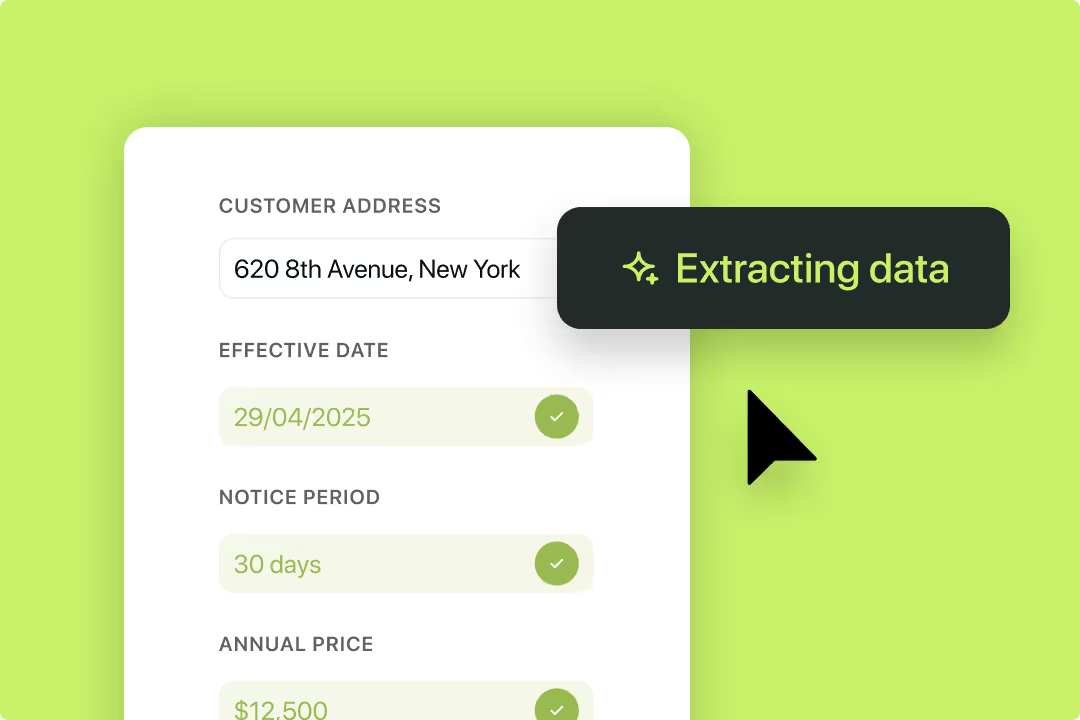Solutions
Customer Support
Resources
Many companies realise too late that they’ve renewed software, services, or supplier agreements they no longer use. Renewal terms buried in PDFs, no clear owner for cancellations, and gaps between Legal and Finance make the problem worse.
Today, almost every business depends on auto-renewals to manage recurring relationships. The real challenge is doing it efficiently, with transparency and control.
This guide explores what auto-renewal contracts are, when they’re enforceable, and how to manage them effectively—whether you’re protecting revenue or preventing unwanted spend.
An auto-renew contract (or automatic renewal contract) is an agreement that renews automatically at the end of its term, unless one of the parties gives notice to terminate it.
These contracts are powered by what’s known as an evergreen clause, which keeps the contract alive for a new term without requiring fresh signatures or amendments.
In practice, this means that unless you take explicit action and terminate the agreement, the contract renews on its own — rolling from one term into the next.
Auto-renew contracts are common in subscription-based businesses, licensing agreements, and supplier contracts, but they’re now becoming standard across many industries, from SaaS and manufacturing to professional services.
Auto-renewal doesn’t always look the same. Companies use different mechanisms to extend agreements without starting from scratch. Here are the main ones:
Contracts that automatically renew are legal, but how you handle them matters.
For example, auto-renew clauses are widely accepted in commercial contracts, provided both parties had the chance to negotiate and review the terms. In these instances, courts typically uphold renewals in B2B settings so long as:

However, auto-renewal clauses in B2C contracts face more scrutiny. Consumers rarely have equal bargaining power, so laws in many jurisdictions — especially across the US and UK — require businesses to:
In the US, several states (like California and New York) have strengthened auto-renewal laws to protect consumers from hidden renewals or “subscription traps.” And we can probably expect similar enforcement trends to continue in 2025, with the UK also sharing new consumer protection measures to crack down on these traps.
But for now, let’s turn our attention back to B2B contracts.
Auto-renewal clauses aren’t just for subscription businesses anymore — they’re a staple in long-term supply, SaaS, and service contracts. But in B2B relationships, the line between efficiency and exposure is thin.
Here’s how to draft auto-renew provisions that are more likely to hold up in court, protect both sides, and still make commercial sense.
In B2B deals, both parties are presumed to understand what they sign — but ambiguity still causes expensive disputes. As a general rule, if two reasonable businesspeople could understand your renewal clause differently, it’s not fit for purpose.
We’ve written an in-depth guide to plain language contracts, but it’s best practice to:
Hidden renewals destroy trust. Sophisticated counterparties expect transparency and, in many industries, procurement teams won’t sign unless the clause is explicit. Can you blame them?
It’s estimated that micro-businesses lost billions in vital funds in 2020, simply because annual contracts and subscriptions auto-renewed without their knowledge. Larger organizations aren’t immune, either. They’re just more likely to have safeguards like contract management solutions in place to catch these unexpected costs.
Our advice is to add a simple renewal summary at the front of your contract alongside other key contract information like contract duration, obligations, and so on.
Even in B2B, passive renewals can backfire if the counterparty argues lack of intent. Sure, renewals are a great way to retain revenue, but at what cost?
If you’re reliant on silence or buried fine print to keep a contract alive, you’re building friction into a relationship that should be based on trust. When a customer feels “trapped” by an auto-renewal, the next negotiation becomes defensive. You might win one more term, but you’ll lose long-term goodwill.
A better approach is affirmative commercial consent: make renewal an active, traceable choice. In fact, you should be actively engaging with and retaining customers ahead of a looming renewal deadline, simply because you want them to stay. Regular checkpoints and action-oriented QBRs are a great way to do this.

Vendr notes that renewal uplifts — especially hidden 5–10 per cent SaaS price increases — are one of the biggest sources of unplanned spend. In B2B deals, that’s a relationship risk as well as a cost one.
If the terms of an agreement are changing, you need to be open and honest about those developments with your counterparty. In fact, some US states (notably New York) require advance written notice for price increases at renewal, even for business customers.
Don’t shy away from these conversations. Bring receipts on why these changes are being made and how value is to be reciprocated under the new terms.
Requirements now differ by country and state, so businesses with international dealings will need to maintain a firm grip on these legal developments across the globe.
It sounds like a daunting task, but you can subscribe to newsletters and communications from law firms operating in the jurisdictions you’re interested in, and specifically opt in to contract-related updates.
But what if you’re not the vendor — you’re the customer? What if you’re the one on the hook for fees you never wanted to renew?
This is where auto-renew contracts become less about convenience and more about control. Most companies don’t intend to overpay for software or suppliers they’ve outgrown — they just miss the cancellation window.
There’s a few common culprits behind this:
By the time anyone spots the renewal clause, the notice period has passed — and the invoice has arrived. Juro changes that.
Juro is an intelligent contract automation platform that helps teams agree and manage contracts in one unified workspace. Instead of juggling Word, email, PDFs, and spreadsheets, Juro gives Legal and Commercial teams a single source of truth for every contract — including renewal dates, owners, and obligations.

Even the most diligent legal teams can’t manually track hundreds of renewal dates without errors. Renewal automation doesn’t just prevent missed cancellations — it restores control.
With Juro, you can see every contract, every term, every deadline in one place. You’ll know exactly which renewals are due, which are worth keeping, and which should be shut down before they cost you another year of spend.
Best of all, this is all achieved with less manual work from your side, as Victoria Sörving, Chief Legal Officer at Funnel explains:
{{quote1}}
Stop paying for contracts you don’t want — and start managing renewals before they manage you.
Fill in the form below to book a personalized Juro demo and see how automated renewal tracking can save your team time, money, and stress.

Lorem ipsum dolor sit amet, consectetur adipiscing elit. Suspendisse varius enim in eros elementum tristique. Duis cursus, mi quis viverra ornare, eros dolor interdum nulla, ut commodo diam libero vitae erat. Aenean faucibus nibh et justo cursus id rutrum lorem imperdiet. Nunc ut sem vitae risus tristique posuere.

